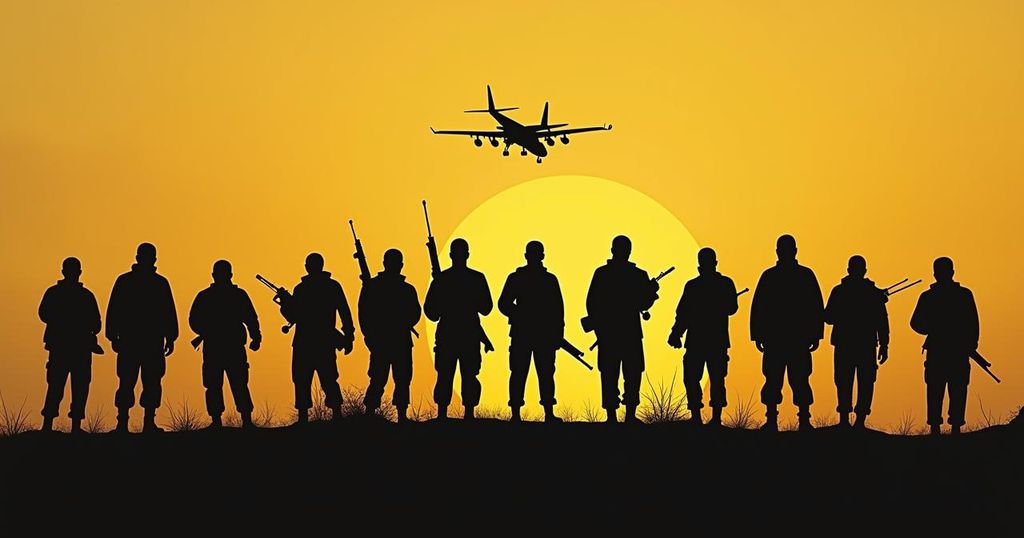Israel’s ongoing military operations have resulted in the assassination of Hezbollah leader Hassan Nasrallah and significant casualties in Lebanon. The UK has urged its citizens to leave Lebanon amid escalating violence. Iran has vowed to retaliate for Nasrallah’s killing, while the humanitarian situation worsens with many displaced. The need for diplomatic solutions is increasingly urgent as the conflict continues to unfold.
Israel’s military campaign in Lebanon has intensified following the reported assassination of Hassan Nasrallah, the long-serving leader of Hezbollah. Sources indicate that his body has been retrieved from the ruins of an Israeli airstrike in Beirut. Following this event, further Israeli strikes on the southern regions of Lebanon and the Beqaa Valley resulted in significant casualties, with reports of at least 15 fatalities over the weekend alone. The Israeli government also asserts that Nabil Kaouk, a senior figure within Hezbollah, has been killed, marking a notable gain in their ongoing conflict with the militant group. The Israeli offensive has led to a devastating toll of over 1,030 lives, including many women and children, within a fortnight, raising concerns over the humanitarian impact of the conflict. The situation prompted urgent warnings from the United Kingdom, advising British nationals to vacate Lebanon immediately due to escalating tensions. Ali Khamenei, Iran’s supreme leader, has vowed retaliation for Nasrallah’s death, describing him as a key figure in the regional resistance against Israeli actions. Khamenei’s comments reflect the larger geopolitical tensions stemming from the conflict, as nations like Iran back Hezbollah’s operations. Editorial analyses suggest that the killing of prominent militant leaders may yield short-term psychological impacts but could ultimately fail to achieve lasting security for Israel. In parallel, Hezbollah has confirmed that Ali Karaki, another senior leader, was also killed alongside Nasrallah during the airstrike. Israel’s military has also reported the discovery and destruction of a Hamas tunnel in Gaza, emphasizing their ongoing security operations against militant infrastructure. Locally, the humanitarian situation in Lebanon is dire, with hundreds of thousands displaced and seeking refuge in makeshift accommodations amidst Israeli bombardments. Prime Minister Najib Mikati has called for a diplomatic response to the assaults, stressing the need for peace negotiations. Despite the chaos, many Lebanese citizens remain resolute in their desire to stay in their homeland, with calls for resilience amidst the ongoing violence. The conflict has also reverberated through Gaza, where additional strikes have resulted in more casualties. The situation remains highly volatile, with international and local stakeholders urging caution and dialogue to alleviate the growing humanitarian crisis in the region.
The Israel-Lebanon conflict has deep historical roots, largely stemming from Israel’s military invasions of Lebanon and the emergence of Hezbollah as a paramilitary force in response to these aggressions. The recent escalation follows a series of Israeli airstrikes purportedly targeting Hezbollah leadership, elevating fears of further violence and instability within the already fragile region. The geopolitical landscape is further complicated by Iranian involvement, as Tehran supports Hezbollah against Israeli actions. The humanitarian implications of the conflict are severe, with thousands displaced and an influx of casualties reported as a direct result of military operations. This complex interplay of military engagement, political maneuvering, and humanitarian crises underscores the urgent need for diplomatic efforts to restore peace.
The ongoing conflict between Israel and Hezbollah has led to significant loss of life and an escalating humanitarian crisis in Lebanon, with recent military actions resulting in both strategic gains for Israel and alarming civilian casualties. The international community faces pressing challenges in mitigating the conflict and addressing the humanitarian needs of the displaced populations. As tensions rise, the potential for retaliation from Hezbollah and its allies remains a critical concern which could further destabilize the region. A diplomatic approach appears imperative to curtail the cycle of violence and foster long-term peace in an already volatile Middle Eastern landscape.
Original Source: www.independent.co.uk






